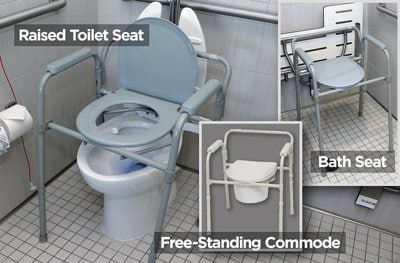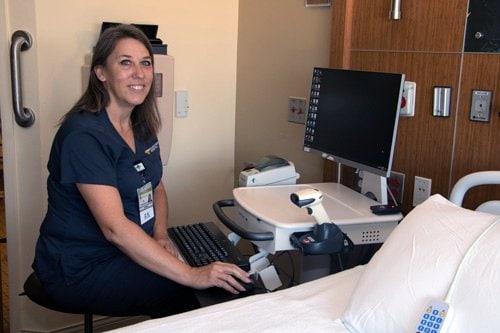Joint Replacement Surgery Education
What to expect when you're having surgery.
The decision to have elective Joint replacement surgery is an important step to help improve your mobility and quality of life. At Silver Cross Hospital, we will help you start arrangements prior to surgery, support you through the surgery and recovery in the hospital, and help make sure your discharge plans meet your needs.
When you make the decision to have surgery, start planning for someone to help you after surgery as it is important that you have assistance when you get home.
What to bring:
- Home medication list
- Equipment if available
- Loose-fitting clothing
- Safe footwear
Your case management team of registered nurses and social workers will help you with your surgical plans such as:
- Coordination of Care
- Discharge Planning
- Arrangements for home care services like medical equipment of skilled nursing care
- Verify Insurance benefits
- Provide patient education
- Address emotional/psychological needs
- Assist with Durable Power of Attorney and Living Will development
Please bring a copy of your Durable Power of Attorney forms, Living Wills, and Do Not Resuscitate forms with you on your day of surgery. If you provide these forms to registration or nursing, they can be scanned into our system for future visits.
After having a hip or knee replacement surgery we want to ensure that you have safe discharge from the hospital. The case management team will work with you to identify your specific needs and have a safe discharge plan in place for you, such as obtaining equipment and or services for after discharge. Equipment needs may include:
- Rolling walker
- 3 in 1 commode
- Home Health RN/Physical Therapy

In most cases, case management can help set up equipment for you, but some insurance companies require authorization and this may take some time to get arranged. If you do not already have equipment, your surgeon’s office may be able to provide you with equipment prior to surgery. Some patients may choose to order equipment on Amazon or obtain rental equipment through local township offices. The Lockport, Frankfort, and Orland Townships are great resources for local residents. Good Will stores often have gently-used equipment available for purchase. If you have stairs at your home you may consider obtaining crutches or a cane prior to surgery.
Hip Kits are available in Walgreens in Pavilion A for approximately $50 and include all of the equipment the Occupational Therapist will review with you when you are in the hospital. It is often more cost-effective to order equipment from Amazon or borrow from friends and family.
3 in 1 commodes are covered under most insurances, but the raised toilet seats are not. If you do not have room in your bathroom and do not want a commode to use outside of your bathroom, you may want to look at medical supply stores or Walgreens, Meijer, CVS, for this item prior to surgery. Please note that this equipment does come in different heights and shapes.
Length of Stay
Your surgeon should let you know how long to expect to be in the hospital after your surgery. Some patients may be allowed to go home the same day of their surgery while others may require a short stay in the hospital. If admitted to the hospital most patients stay approximately 1-2 nights.
Many joint replacements are Observation admissions, meaning only 1 overnight stay, so plan to have help at home and arrange your living area if you anticipate difficulty managing your home and stairs. Your physician will determine your admission status prior to your surgery. Commercial insurance will provide authorization for your procedure which determines your admission status.
Questions
If you have questions for the case management team prior to surgery, please feel free to reach out to them at 815-300-7115.
Managing Your Pain

Oral pain medications will be started immediately after surgery to help manage your pain. These medications are usually ordered to be given as needed between every 4-6 hours, so please let the nurse know when you are getting uncomfortable. Ensuring your pain is controlled is an important element of healing and will allow for your participation in physical and occupational therapy sessions. The nursing staff works closely with the physical and occupational therapists to ensure that pain medications are given before your therapy sessions to maximize your ability to participate. IV pain medications may also be ordered for breakthrough pain relief when taking oral pain medications.
You may have a patient-controlled analgesia (PCA) pain pump after surgery. This is a pain pump that delivers pain medication through your IV on demand and is controlled by you.
Cold Therapy
Application of cold therapy is necessary for reduction of pain and swelling at the incision site. In the hospital ice packs are provided and the staff will assist with the application and filling of the ice packs.
Dressings
Your surgical dressing is changed after surgery as directed by your surgeon. The nursing staff frequently checks your surgical dressing to ensure its integrity and will reinforce the dressing as needed.
Some surgeons utilize a Prevena Wound Vacuum over the surgical incision site. This is a portable disposable system that utilizes negative pressure to protect your incision. If your surgeon does apply this device you will receive teaching on it prior to leaving the hospital.
SCDs/TED Hose
Sequential Compression Devices (SCD) and TED (anti-embolism) hose help prevent post-operative blood clots. SCDS should be worn while you are in bed at the hospital. TED hose should be worn at all times but can be removed when bathing. It is best if you apply the TED hose first thing in the morning.
New Medications
As additional protection from infection, you will usually receive two doses of antibiotics after surgery.
The doctor will prescribe you a blood thinner to take at home for or a designated amount of time after surgery. Blood thinners are given for the prevention of blood clots.
Nausea can be a side effect of pain medications and or anesthesia. The doctor will prescribe anti-nausea medications to be given as needed if you are experiencing nausea.
Constipation can occur from decreased activity and is also a side effect of some pain medications. It is important that pain medications are taken as needed to manage your surgical pain so your doctor may prescribe stool softeners such as Colace or Milk of Magnesia to be taken.
Home Medications
As additional protection from infection, you will usually receive two doses of antibiotics after surgery.
The doctor will prescribe you a blood thinner to take at home for or a designated amount of time after surgery. Blood thinners are given for the prevention of blood clots.
Nausea can be a side effect of pain medications and or anesthesia. The doctor will prescribe anti-nausea medications to be given as needed if you are experiencing nausea.
Constipation can occur from decreased activity and is also a side effect of some pain medications. It is important that pain medications are taken as needed to manage your surgical pain so your doctor may prescribe stool softeners such as Colace or Milk of Magnesia to be taken.
Home Medications
Please bring a list of home medications with you the day of surgery. The nursing staff will review all of your home medications and your doctor will decide if your medications can be taken while you are in the hospital. You do not need to bring your own medications in from home as the pharmacy will distribute medications to you while you are in the hospital.
Diet
As soon as you are awake and alert you will be offered clear liquids. Begin to drink liquids slowly to ensure you are not nauseated. Your doctor will advance your diet as tolerated after surgery.
Laboratory
After surgery, you will have your blood checked daily to monitor for post-surgical blood loss.
This lab test will help the doctor decide if you need to have a blood transfusion.
Safety
Being in an unfamiliar room, using pain medications, and having surgery can put you at risk for falls. Your safety is important to us and ask that you call a staff member for help before getting up. To help us meet your needs, we may use a bed alarm or a chair alarm to alert the staff to come help you if you forget to call and begin to get up without assistance.
Before Surgery
In order to help prevent infection prior to surgery please DO NOT SHAVE your legs. You will also receive a special (CHG) bath to help kill microbes on your skin when you arrive on the day of surgery.
After Discharge
In order to help prevent infection, remember to wash your hands before and after touching your incision site or doing any dressing changes. Ask anyone helping to care for you, to wash their hands before providing care as well.
Monitor your incision site for redness, increased swelling, increase in temperature, or drainage at the incision site. If you have any of these symptoms it is important that you report these to your physician right away.